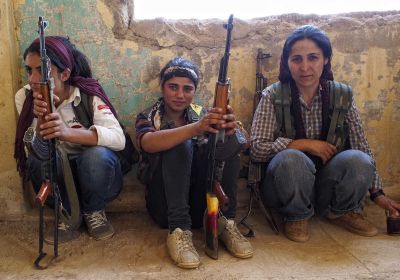
-
 The July 23 deal between the US and Turkey — which gives the US access to Turkey's Incirlik airbase and officially brings Turkey into the US-led “war on ISIS” — makes one thing clear. For Turkish President Recep Tayyip Erdogan and his ruling Justice and Development Party (AKP), the real enemy is not the terrorist group calling itself the Islamic State — more commonly known as the Islamic State of Iraq and Syria (ISIS). It is the Kurdish freedom movement and the Turkish left.
The July 23 deal between the US and Turkey — which gives the US access to Turkey's Incirlik airbase and officially brings Turkey into the US-led “war on ISIS” — makes one thing clear. For Turkish President Recep Tayyip Erdogan and his ruling Justice and Development Party (AKP), the real enemy is not the terrorist group calling itself the Islamic State — more commonly known as the Islamic State of Iraq and Syria (ISIS). It is the Kurdish freedom movement and the Turkish left. -
 Turkish police repress protests against Erdogan's renewed war.
The outcome of Turkey’s June 7 parliamentary elections promised so much.
Turkish police repress protests against Erdogan's renewed war.
The outcome of Turkey’s June 7 parliamentary elections promised so much.
-
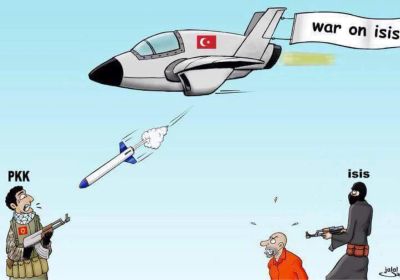
Turkey has “joined the war against ISIS”, according to US politicians and the corporate media after a July 23 deal between the US and the Turkish government. The deal gives US war planes and drones access to Turkey's Incirlik airbase from which to conduct air strikes in Syria and Iraq.
-
 YPJ resistance fighter, Rojava. Picture: The Rojava Report.
YPJ resistance fighter, Rojava. Picture: The Rojava Report.
-
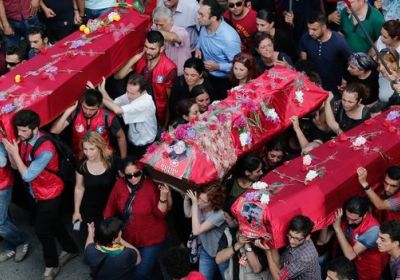 On July 20, 32 people were killed in a suicide bombing attack on a cultural centre in Suruç, a town in Turkish Kurdistan. More than 100 were injured. Suruç is located across the border from the Syrian Kurdish town of Kobanê, which was besieged by forces of the self-styled Islamic State terrorist group, also known as the Islamic State of Iraq and Syria (ISIS), between September and January.
On July 20, 32 people were killed in a suicide bombing attack on a cultural centre in Suruç, a town in Turkish Kurdistan. More than 100 were injured. Suruç is located across the border from the Syrian Kurdish town of Kobanê, which was besieged by forces of the self-styled Islamic State terrorist group, also known as the Islamic State of Iraq and Syria (ISIS), between September and January. -
At a protest outside the Turkish Consulate in Sydney on July 23, Kurdish activists and their supporters accused the Turkish government of complicity in the massacre in Suruc of 32 young socialists on their way to help rebuild Kobane, in the liberated area of Rojava in northern Syria.
-
 45 people gathered in Perth on July 24 to express solidarity with a group of young people who were victims of an Islamic State suicide bombing in the Kurdish town of Suruç on July 20.
45 people gathered in Perth on July 24 to express solidarity with a group of young people who were victims of an Islamic State suicide bombing in the Kurdish town of Suruç on July 20.
-
-
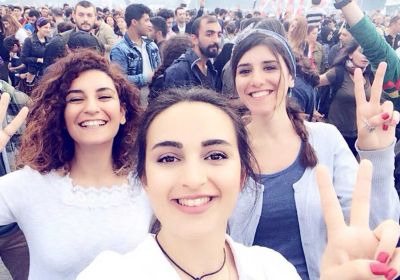
At least 30 people were killed and more than 100 injured on July 20, when ISIS suicide bomber from the self-styled Islamic State group attacked a cultural centre in the Kurdish town of Suruç, on the Turkish side of the border from Kobane.
-
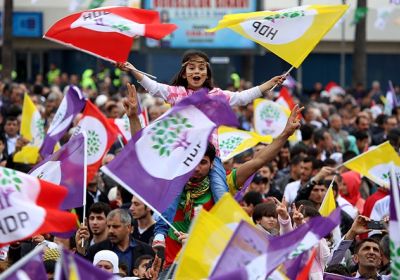 One month after Turkey’s June 7 parliamentary elections, the country still does not have a government. Ahmet Davutoglu of the Justice and Development Party (AKP) remains caretaker prime minister. President Recep Tayyip Erdogan remains the dominant figure in the AKP and is manoeuvring to retain his party’s leading position. The president is supposed to be an impartial figure above party politics but Erdogan pays scant regard to such constitutional niceties. The elections were marked by two significant and related developments.
One month after Turkey’s June 7 parliamentary elections, the country still does not have a government. Ahmet Davutoglu of the Justice and Development Party (AKP) remains caretaker prime minister. President Recep Tayyip Erdogan remains the dominant figure in the AKP and is manoeuvring to retain his party’s leading position. The president is supposed to be an impartial figure above party politics but Erdogan pays scant regard to such constitutional niceties. The elections were marked by two significant and related developments. -
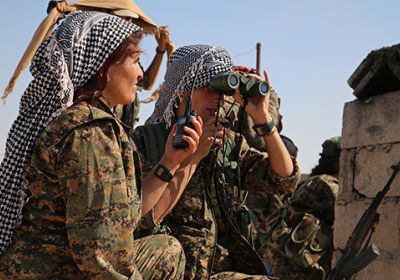
The “Islamic State” (IS) terror group attacks in Tunisia, Kuwait and France have grabbed global attention and condemnation. But the group's attack on Kobane in Rojava (Syrian Kurdistan) — and the fierce resistance — has been largely ignored.
-
 Turkish-backed terrorists have massacred civilians in Kobanê. Photo: Kurdish Resistance & Liberation/Facebook.
Turkish-backed terrorists have massacred civilians in Kobanê. Photo: Kurdish Resistance & Liberation/Facebook.
